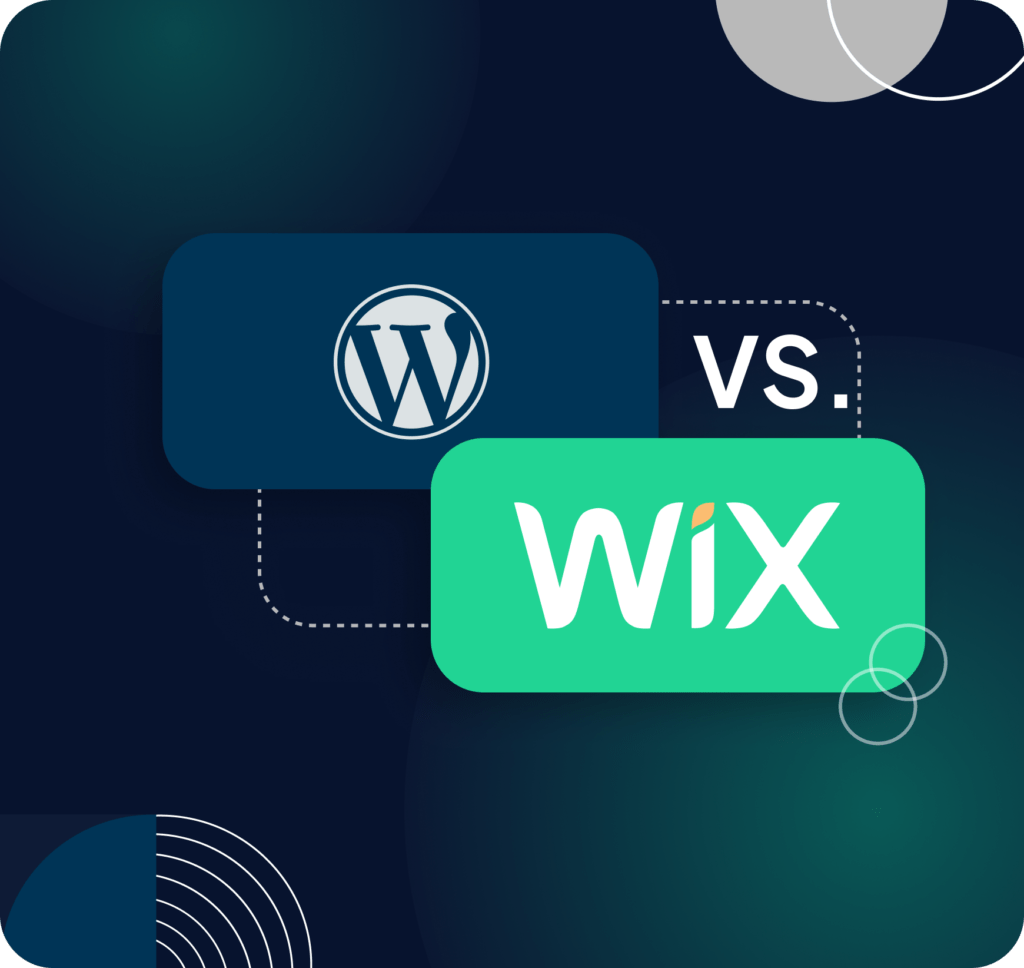Choosing between WordPress vs Shopify is an important decision that should be carefully considered. If you are planning to launch your own online store, these two platforms are the most popular and functional.
As the e-commerce landscape is constantly evolving, choosing the right platform for your online store is increasingly difficult, but no less important. In 2025, WordPress and Shopify remain two of the most popular options for building eCommerce websites, each offering unique benefits and features. WordPress is known for its steep customization and flexibility, while Shopify is famous for its ease of use and comprehensive, out-of-the-box solutions. In this article, we’ll take a look at the key features, advantages, and disadvantages of both platforms to help you determine which one is best for your eCommerce business.
Appropriate for whom?
WordPress (Woocommerce)
WordPress is ideal for small- to medium-sized businesses that require developing an online store. With its flexibility and powerful tools like WooCommerce, WordPress makes it easy to create and customize online stores with minimal effort. 42% of all online stores are powered by WooCommerce. Even large companies like Sony and The Walt Disney Company choose WordPress for its performance, ease of use, and SEO optimization to attract customers.
Shopify
Shopify is ideal for small and medium-sized businesses that want to quickly launch an online store without technical knowledge. Shopify offers a user-friendly interface and all the e-commerce tools you need. More than 1.7 million businesses around the world use Shopify, including big brands like Tesla and Red Bull.
What is WordPress for?
WordPress is a CMS that powers millions of websites globally. There are two distinct versions of WordPress available: hosted WordPress (WordPress.com) and self-hosted WordPress (WordPress.org).
Hosted WordPress Sites Overview
Hosted WordPress, available at WordPress.com, operates on a Software as a Service (SaaS) model. This platform offers a comprehensive suite of tools for building and maintaining blogs, websites, or e-commerce sites, all without requiring extensive technical expertise. Users pay a monthly or annual fee to access these features, making it an accessible option for many.
- Free. $0
- Starter. $9/month
- Explorer. $18/month
- Creator. $40/month
- Entrepreneur. $70/month
Opting for annual payment plans reduces these costs significantly. The Creator and Entrepreneur plans are particularly suited for eCommerce as they support the addition of plugins and other eCommerce tools, making it easier for businesses to sell products online.
Choosing hosted WordPress means you don’t have to worry about web hosting, server management, or technical maintenance. The platform takes care of these aspects, allowing you to focus on creating content and growing your site. With a user-friendly interface and robust customer support, hosted WordPress makes it easy for anyone to establish a professional and functional online presence.
Self-hosted WordPress Overview
Self-hosted WordPress, available for download at WordPress.org, offers a world of possibilities for those seeking complete control over their website. As open-source software, its code is freely accessible and highly modifiable, making it a favorite among developers and tech-savvy users.
Complete Control and Customization
By installing self-hosted WordPress on your own web server, you unlock the full potential of customization. Unlike hosted solutions, this version allows you to tweak every aspect of your site, from the layout and design to the underlying functionality. With thousands of plugins and themes at your disposal, you can create a unique, tailored experience that aligns perfectly with your vision.
Costs to Consider
While the WordPress software itself is free, there are several costs to keep in mind.
- Hosting. You will need to purchase server space to host your website.
- Domain Registration. Acquiring a custom domain name to establish your online presence.
- Development Expenses. Depending on your needs, you might require professional help to develop and maintain your site.
These investments are well worth it for those seeking extensive customization and scalability. Self-hosted WordPress is particularly favored by businesses and professionals who need a robust, flexible platform that can grow and adapt alongside their requirements.
Why Choose Self-Hosted WordPress?
Self-hosted WordPress is ideal for anyone looking to push the boundaries of what’s possible with their website. Whether you’re a business aiming for extensive growth or a developer wanting to experiment with the latest web technologies, this version provides the tools and freedom you need. The ability to fully customize and control your site makes it a powerful solution for creating a distinctive and high-performing online presence.
WordPress Costs Overview
Building a WordPress site involves several costs beyond the free content management system. Especially for businesses, these additional expenses are crucial to consider for optimal site performance and functionality.
Key Expenses to Anticipate
- Hosting. Hosting is a fundamental requirement for running WordPress. Shared hosting options like HostGator are budget-friendly but may compromise on speed and security. For superior performance and security, managed WordPress hosting services like Kinsta or WP Engine are recommended, although they come at a higher price.
- Themes. While free themes are available, premium themes typically offer higher quality and more customization options. A premium theme might cost around $175 as a one-time fee, providing a polished look and feel to your site.
- Ecommerce Integration. If you’re planning to sell products online, integrating ecommerce tools is essential. Solutions like Ecwid can cost approximately $300 annually, enabling robust online sales capabilities.
- Plugins. Plugins extend the functionality of your WordPress site. While many free plugins are available, premium plugins, which can cost around $100 – 200 annually for a set of four, often provide more advanced and reliable features.
- Developer Fees. Depending on your technical expertise, hiring a developer might be necessary to build and maintain a high-quality website. This can significantly increase your costs but ensures professional-grade results.
While the WordPress CMS is free, these additional expenses are necessary for a fully functional and optimized website. Investing in quality hosting, themes, ecommerce tools, and plugins can significantly enhance your site’s performance, security, and user experience. Although costs can add up, the benefits of a professionally managed WordPress site often justify the investment, particularly for businesses aiming to establish a strong online presence.
WordPress Customization and Flexibility for eCommerce
A significant advantage of WordPress over platforms like Shopify is its ability to host on any server and the extensive customization it allows. While Shopify provides a reliable and straightforward solution for building eCommerce sites, it comes with inherent limitations on customization and must be hosted on Shopify’s servers. In contrast, WordPress offers unlimited possibilities for modification, making it an ideal choice for those who need more flexibility and control over their website’s functionality and design.
So, the choice between WordPress and Shopify depends on your specific needs, technical skills, and budget. WordPress stands out for its flexibility, extensive customization options, and scalability, making it a preferred choice for many businesses and developers worldwide.
WordPress vs Shopify: User Base Comparison
As of 2025, WordPress and Shopify continue to dominate the eCommerce landscape, each boasting substantial user bases.
WordPress User Base
WordPress powers over 40% of all websites on the internet, which translates to millions of active sites. Its popularity spans from personal blogs to major corporate websites, owing to its extensive customization options and flexibility. A significant portion of these sites leverage WooCommerce, the leading eCommerce plugin for WordPress, which powers over 28% of all online stores globally.
Shopify User Base
Shopify, on the other hand, is specifically designed for eCommerce and has a robust user base of over 1.75 million merchants. This platform’s user-friendly interface and comprehensive eCommerce tools make it a preferred choice for businesses of all sizes, from small startups to large enterprises.
Both platforms have a strong and growing user base, with WordPress offering greater flexibility and customization for a wide range of websites, while Shopify provides a streamlined, dedicated eCommerce solution. Your choice between the two will depend on your specific business needs, technical expertise, and long-term goals.
What is Woocommerce?
WooCommerce is a versatile and user-friendly e-commerce plugin for WordPress, making it a popular choice for online stores. It offers easy integration with WordPress, allowing users to utilize many of the platform’s features and capabilities specifically for ecommerce. WooCommerce itself is free to install, but there are additional costs associated with running a fully functional online store, such as web hosting, a domain name, and any premium themes or extensions needed to enhance the store’s functionality.
Custom development with WooCommerce provides many opportunities for online store owners, allowing businesses to tailor their online store to their specific needs. Developers can create custom plugins, themes, and integrations that perfectly match the unique requirements of the business, providing a personalized shopping experience for customers. This flexibility allows for a wide range of customization options, from product pages and checkout processes to payment gateways and delivery methods.
The benefits of using WooCommerce for e-commerce are numerous. It provides an easy-to-use interface that simplifies product, order, and customer management. The platform supports a wide range of products, including physical goods, digital products, and even subscriptions. In addition, WooCommerce benefits from the large WordPress ecosystem, which includes thousands of plugins and themes that can extend the functionality of an online store. With its strong community support and extensive documentation, WooCommerce is the perfect solution for businesses of all sizes looking to build or expand their online presence.
🔎 You can learn more about online stores development on Woocommerce
What is Shopify?
Shopify is a versatile web application designed for merchants aiming to create and manage their online stores effortlessly. It offers a wide range of customizable templates, or themes, which can be tailored to match a business’s unique branding and style. This platform supports the sale of both physical and digital products, making it a comprehensive solution for various types of businesses.
One of Shopify’s standout features is its user-friendliness. It caters specifically to individuals who lack technical or design expertise, enabling them to set up and run a fully functional online store without any coding knowledge. For those with technical skills, Shopify allows for deeper customization by editing the HTML and CSS, providing the flexibility to meet specific business requirements.
Shopify is a hosted solution, meaning it takes care of all backend infrastructure on its own servers. Users don’t need to worry about purchasing web hosting or installing additional software. Everything needed to build and operate an online store is included out of the box, offering a seamless and hassle-free setup experience. This makes Shopify an excellent choice for those who want a straightforward approach to e-commerce.
Operating on a software as a service (SaaS) model, Shopify users pay a monthly fee to access the platform. This subscription model includes various pricing tiers, each offering different levels of functionality and support to accommodate businesses of all sizes and needs.
Being a cloud-based application, Shopify can be accessed from anywhere with an internet connection. This allows business owners to manage their stores from any location, which is ideal for those who need to oversee operations on the go.
Shopify also supports a wide array of apps to enhance its functionality. These apps enable users to add new features, improve customer experience, and optimize their store for better performance. The extensive app marketplace ensures that there are solutions for virtually any requirement.
Shopify Costs
Shopify operates on a subscription-based model, offering various pricing plans to accommodate businesses of all sizes and needs. The most basic plan is the “Shopify Basic” plan, which costs $39 per month. This plan includes all the essential features needed to set up an online store, such as a website, blog, unlimited products, and 24/7 support.
The “Shopify” plan, priced at $105 per month, adds more advanced features like professional reports and better shipping discounts. For larger businesses, the “Advanced Shopify” plan costs $399 per month and includes advanced report building and the lowest transaction fees.
In addition to these monthly fees, Shopify also charges transaction fees on sales made through the platform, ranging from 2.9% + 30¢ per transaction on the Basic plan to 2.4% + 30¢ on the Advanced plan. However, these fees can be waived if you use Shopify Payments as your payment processor. Extra costs may include premium themes, apps, and additional features, allowing businesses to scale their stores as needed.
- Starter. $5 per month.
- Basic. $39 per month.
- Shopify. $105 per month.
- Advanced. $399 per month.
- Plus. usually $2,300 or $2,500 per month, depending on whether you pay annually or on a 3-year basis.
The ‘Starter’ plan from Shopify offers a simple storefront that lets you showcase products, sell them on your existing website or social media channels, and conduct physical sales. However, it doesn’t provide a fully customizable standalone store. Account access varies by plan, with 1 user on the Basic plan, 5 on the Shopify plan, and 15 on the Advanced Shopify plan. As you opt for higher-priced plans, you’ll benefit from lower credit card and transaction fees. To fully utilize point-of-sale capabilities for in-person sales, the ‘Shopify POS Pro’ add-on is available at $89 per month, per location. The ‘Advanced’ plan is equipped with comprehensive international selling features. For businesses with more complex needs like API integration, server uptime, task automation, and extensive support, the ‘Shopify Plus’ plan is designed to meet these enterprise-level requirements.
Comparing WordPress and Shopify Themes
Usability
- WordPress Themes
WordPress themes offer good flexibility and customization options. With thousands of free and premium themes available, users can find a design that perfectly fits their needs. The handy WordPress Customizer makes it easy to make changes without any coding knowledge. However, for advanced customization, users may need to delve deeper into CSS and PHP.
- Shopify Themes
Shopify themes are designed with an emphasis on easy use. Users can quickly create and customize their store with a simple drag-and-drop interface. While the customization options are somewhat limited compared to WordPress, they are generally sufficient for most eCommerce needs. Shopify themes are especially handy for those without technical knowledge.
Ease of implementation
- WordPress Themes
Implementing a WordPress theme can be simple, especially with the one-click installation option. However, creating a fully customized website may require additional plugins and customization of the theme. This may require some technical knowledge or developer assistance.
- Shopify Themes
Shopify themes are easy to install and customize. With built-in customization tools and a simple installation process, users can get their store up and running quickly. The structured environment of the platform ensures that even those with minimal technical skills can create a professional looking store.
Costs
- WordPress Themes
WordPress offers a combination of free and premium themes. Free themes are plentiful and can be a good starting point, but premium themes, which cost between $30 and $100, often provide more advanced features and better support. Additional costs can include plugins and developer fees for customization.
- Shopify Themes
Shopify also provides free and premium themes. Free themes are limited but functional. Premium themes, priced between $140 and $180, offer more complex designs and features. While the initial cost may be higher, themes come with built-in support and regular updates.
Development or installation/customization process
- WordPress Themes
Installing a WordPress theme involves installing the theme and necessary plugins, and then customizing using WordPress Customizer or a page builder such as Elementor. Advanced customizations may require coding, making the process potentially difficult for non-developers.
- Shopify Themes
The process of developing Shopify themes is simplified. Once users select a theme, they can customize it in the Shopify editor. For those who need advanced features, Liquid’s template language allows developers to create very complex themes, although this is not necessary for most users.
Marketplace and Custom Development
- WordPress Themes
The WordPress theme marketplace is huge, with options for almost every niche. Thanks to the open-source nature of WordPress, custom development is quite possible. This allows companies to create a fully customized design and functionality to meet their specific needs.
- Shopify Themes
The market for Shopify themes is smaller but well-saturated. Themes are designed specifically for e-commerce, ensuring that they meet the needs of online stores. Custom development is possible using Shopify’s Liquid language, allowing for extensive customization within the constraints of the platform.
Therefore, WordPress and Shopify offer many theming options to suit different user needs. WordPress provides more flexibility and customization options, which is ideal for those who need a customized site and have some technical skills. Shopify features ease of use and simplified customization, making it suitable for users who want to quickly create an online store with minimal technical effort. Choosing between these two options largely depends on your specific requirements, technical knowledge and budget.
Comparing WordPress and Shopify custom development
Flexibility and Customization
- WordPress
WordPress is renowned for its unparalleled flexibility. Being an open-source platform, it allows developers to customize every aspect of a website. Custom development with WordPress can involve creating bespoke themes and plugins tailored to specific business needs. With thousands of available plugins and themes, businesses can extend functionality and design beyond the basic offerings. This makes WordPress particularly suitable for complex websites requiring unique features and integrations.
- Shopify
Shopify, while also customizable, operates within a more controlled environment. It offers a range of themes and apps that can significantly enhance the functionality and design of an online store. However, the customization scope is more limited compared to WordPress. Shopify’s proprietary coding language, Liquid, allows developers to modify the front-end, but deep customization and backend alterations are restricted to ensure platform stability and security.
Ease of Development
- WordPress
Developing custom features on WordPress requires a good understanding of PHP, HTML, CSS, and JavaScript. The learning curve can be steep for beginners, but the extensive community and vast array of tutorials and documentation make it manageable. WordPress development is ideal for businesses with access to skilled developers who can leverage the platform’s flexibility to create highly customized solutions.
- Shopify
Shopify’s development environment is more user-friendly for those with limited coding knowledge. Its drag-and-drop builder and intuitive interface allow users to create and manage their stores with ease. For custom development, knowledge of Liquid is necessary, but Shopify’s structured framework and extensive app marketplace can help users implement complex features without deep technical expertise.
Cost of Development
- WordPress
While WordPress itself is free, custom development can become costly depending on the project’s complexity. Businesses need to account for expenses related to hosting, premium themes, plugins, and developer fees. The open-source nature of WordPress can lead to varied development costs, often lower initially but potentially higher with extensive customization and ongoing maintenance.
- Shopify
Shopify’s cost structure is more predictable. It operates on a subscription basis with tiered pricing plans that include hosting and security. Additional costs may arise from premium themes, apps, and any custom development services required. While initially more expensive than WordPress, Shopify’s built-in features and support can offset some development costs, making it a more streamlined option for some businesses.
Scalability and Performance
- WordPress
Scalability on WordPress depends largely on the hosting environment. With the right hosting plan, a WordPress site can handle significant traffic and extensive custom features. However, performance optimization requires careful management of themes, plugins, and server resources to prevent slow load times and downtime.
- Shopify
Shopify’s hosted solution ensures high performance and scalability out of the box. The platform handles server maintenance, security, and updates, allowing businesses to focus on growth. Shopify can efficiently manage high traffic volumes and large inventories, making it an attractive option for rapidly expanding e-commerce businesses.
Comparing WordPress and Shopify SEO Capabilities
Customizability and Control
- WordPress
WordPress is known for its high degree of customizability and control over SEO settings. Users can access and edit the underlying code, allowing for precise optimization of various SEO elements such as meta tags, headers, and URLs. Additionally, WordPress offers a wide range of SEO plugins like Yoast SEO and All in One SEO Pack, which provide advanced features and granular control over on-page SEO.
- Shopify
Shopify also provides essential SEO features, but the level of customization is more limited compared to WordPress. While users can edit meta tags, alt text, and product descriptions, some advanced SEO tasks may require custom coding or third-party apps. Shopify’s SEO settings are designed to be user-friendly, making it easier for beginners to optimize their stores without needing extensive technical knowledge.
URL Structure and Flexibility
- WordPress
WordPress allows for complete control over URL structure, enabling users to create clean, SEO-friendly URLs. This flexibility is crucial for optimizing site structure and ensuring that URLs contain relevant keywords. With WordPress, you can customize permalink settings to suit your SEO strategy.
- Shopify
Shopify’s URL structure is somewhat rigid, which can be a limitation for SEO. For example, all product URLs will include “/products/” as part of the URL, which cannot be removed. This lack of flexibility can make it harder to create the most SEO-friendly URLs, although it generally doesn’t pose a significant issue for most e-commerce sites.
Speed and Performance
- WordPress
Site speed is a critical factor for SEO, and WordPress performance depends heavily on hosting and site optimization. Users need to choose a reliable hosting provider and may need to use caching plugins and other performance enhancements to ensure fast loading times.
- Shopify
Shopify is a hosted solution optimized for speed and performance out of the box. The platform handles all server maintenance, security, and updates, ensuring that your store loads quickly and reliably. This is a significant advantage for SEO, as faster sites typically rank better in search engine results.
Mobile Optimization
- WordPress
Mobile optimization on WordPress depends on the chosen theme and any customizations made. Many modern WordPress themes are responsive, but it’s crucial to test and ensure that the mobile version of your site provides an excellent user experience. Plugins and additional coding may be required for further optimization.
- Shopify
Shopify themes are designed to be mobile-friendly, ensuring that your store looks good and functions well on mobile devices right from the start. The platform’s emphasis on responsive design helps improve mobile SEO, as search engines prioritize mobile-friendly sites in their rankings.
SEO Plugins and Apps
- WordPress
WordPress has a vast ecosystem of SEO plugins that can significantly enhance your site’s SEO capabilities. Popular plugins like Yoast SEO offer comprehensive features, including keyword optimization, readability analysis, and XML sitemaps, making it easier to manage and improve your SEO efforts.
- Shopify
Shopify offers a range of SEO apps in its app store, but the selection is smaller compared to WordPress. These apps can help with various SEO tasks, such as optimizing images, generating sitemaps, and improving site structure. While not as extensive as WordPress plugins, Shopify’s SEO apps provide essential tools for e-commerce optimization.
Content Management
- WordPress
WordPress started as a blogging platform and excels in content management. It provides robust tools for creating and managing content, including blog posts, pages, and custom post types. Regularly updating your site with fresh, high-quality content is a proven strategy for improving SEO.
- Shopify
Includes blogging capabilities, but its content management features are not as advanced as WordPress. While you can create and manage blog posts, the flexibility and functionality are more limited. However, for many e-commerce businesses, Shopify’s content tools are sufficient to maintain a blog and improve SEO.
Comparing WordPress and Shopify E-commerce Features
Regarding eCommerce, both WordPress and Shopify offer robust features, but they cater to different needs and user preferences. Here’s a detailed comparison of their eCommerce capabilities.
Product Management and Catalog Setup
WordPress (with WooCommerce)
WooCommerce, the most popular WordPress plugin for eCommerce, allows for extensive product management.
- Supports a wide variety of product types, including physical, digital, and variable products.
- Offers advanced options like product attributes, custom fields, and downloadable files.
- Product catalog setup is highly customizable, allowing for tailored product pages and layouts.
- Integrates seamlessly with other WordPress plugins for added functionalities.
Shopify
- Shopify offers a streamlined product management system with an intuitive interface.
- Supports physical, digital, and service-based products.
- Advanced product options include variants, SKUs, and inventory management.
- Built-in features for bulk product imports, making it easy to manage large catalogs.
- Offers a range of free and paid themes designed specifically for product showcasing.
- Payment Gateways and Transaction Fees
Payment gateways and transaction fees
WordPress (with WooCommerce)
- WooCommerce supports numerous payment gateways, including PayPal, Stripe, Square, and many others.
- Transaction fees depend on the chosen payment gateway and the hosting provider.
- Offers flexibility in choosing and integrating custom payment solutions.
Shopify
- Shopify has built-in support for a wide range of payment gateways, including its own Shopify Payments.
- Using Shopify Payments eliminates transaction fees, but other gateways may incur additional fees.
- Provides a seamless and secure checkout process for customers.
Shipping and Tax Options
WordPress (with WooCommerce)
- WooCommerce provides flexible shipping options, including flat rate, free shipping, and real-time shipping calculations.
- Tax settings are highly customizable, allowing for global tax rates, automated tax calculations, and tax exemptions.
- Integration with various shipping carriers through plugins for real-time rates and tracking.
Shopify
- Shopify offers integrated shipping solutions with partnerships with major carriers like USPS, UPS, and DHL.
- Provides real-time shipping rates, label printing, and order tracking.
- Automated tax calculations based on customer location, with advanced settings for different tax scenarios.
Inventory Management and Order Fulfillment
WordPress (with WooCommerce)
- WooCommerce offers basic inventory management features, including stock status, backorders, and low-stock notifications.
- Plugins can extend inventory management capabilities, including multi-warehouse management and advanced stock reports.
- Integrates with fulfillment services and dropshipping solutions through third-party plugins.
Shopify
- Shopify provides a robust inventory management system out of the box, with options for tracking stock levels, setting reorder points, and managing multiple locations.
- Advanced order fulfillment features include automated workflows, integration with fulfillment centers, and in-house fulfillment services.
- Shopify POS integration allows for seamless management of online and offline sales.
Final Thoughts
Choosing between WordPress and Shopify for your eCommerce needs in 2025 boils down to your specific requirements, technical expertise, and long-term business goals.
WordPress offers unmatched flexibility and customization, making it ideal for those who want complete control over their site’s functionality and design. Its vast library of plugins and themes allows for a highly personalized shopping experience. However, it requires more hands-on management and potentially higher costs for hosting, security, and development.
Shopify, on the other hand, provides a user-friendly, all-in-one solution perfect for those who prefer simplicity and reliability. It’s an excellent choice for beginners or those who want to quickly launch a store without dealing with technical details. Shopify handles hosting, security, and updates, but its customization options are more limited compared to WordPress.
In conclusion, WordPress is better suited for businesses looking for extensive customization and scalability, while Shopify is ideal for those seeking a hassle-free, turnkey eCommerce solution. Both platforms have their strengths, and the right choice depends on your business’s unique needs.
If you decide that WordPress is the right fit for your online shop, Artilab is here to help. Our team of experts specializes in custom WordPress development, ensuring your eCommerce site is tailored to your exact specifications and optimized for success. Contact us today to get started on building your perfect online store.












